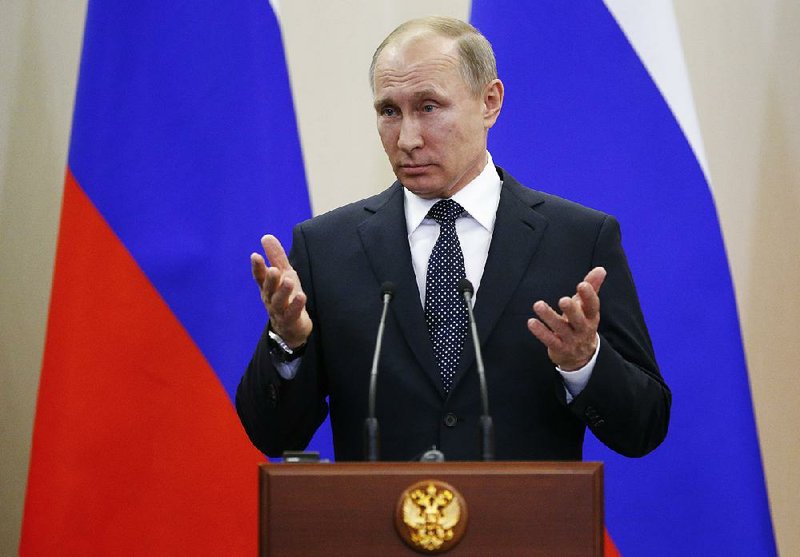MOSCOW -- Saying that lasting peace in Syria is impossible without the participation of the United States, Russian President Vladimir Putin expressed hope Tuesday -- ahead of a telephone conversation with President Donald Trump -- that Moscow and Washington could agree on how to end the 6-year-old civil war.
"I hope that we will achieve understanding on joint measures in this very important and very delicate area of international politics," Putin said at a nationally broadcast news conference with German Chancellor Angela Merkel, who met with the Russian leader Tuesday in the Black Sea resort of Sochi.
Trump's phone call with Putin was their first publicly announced conversation since U.S. missiles hit a Syrian air base last month, a strike that Trump ordered in retaliation for a sarin nerve agent attack believed to have been carried out by the forces of Syrian President Bashar Assad.
Putin has said the attack, which killed more than 80 people, was a provocation by rebel forces. Trump, who expressed admiration for Putin during the U.S. presidential campaign, said after the missile strike that relations with Russia "may be at an all-time low."
[PRESIDENT TRUMP: Timeline, appointments, executive orders + guide to actions in first 100 days]
"Certainly, without involvement of such a country as the U.S., these problems cannot be solved efficiently," Putin said.
In their phone call Tuesday, Trump and Putin agreed to work together to broker a cease-fire in Syria.
Trump agreed to send a representative to Russian-sponsored cease-fire talks starting today in Astana, Kazakhstan, and the two leaders assigned their top diplomats to coordinate efforts. They also discussed meeting in Germany in July.
But the White House and Kremlin offered differing accounts of how far the two presidents had gone in exploring the idea of establishing safe zones in Syria to protect civilians, a concept Trump has advocated since last year's presidential campaign. The White House statement said the talk had "included the discussion of safe, or de-escalation, zones to achieve lasting peace for humanitarian and many other reasons."
The Kremlin made no mention of safe zones in its own statement after the phone call, and Putin's spokesman downplayed the idea. "The subject was mentioned but was not discussed in detail," he told the state-run Tass news agency.
Still, both sides offered positive assessments of the conversation, with the White House characterizing it as "a very good one" and the Kremlin calling it "businesslike and constructive." Neither side mentioned the dispute over the chemical attack and cruise missile strike.
On Monday, Secretary of State Rex Tillerson and Russian Foreign Minister Sergey Lavrov agreed in a phone conversation to meet on the sidelines of an Arctic Council meeting next week in Fairbanks, Alaska, according to State Department and Russian officials.
Putin has orchestrated a peace process in Syria that has brought together competing regional powers Iran and Turkey. Turkish President Recep Tayyip Erdogan is visiting Sochi today to discuss Syria with the Russian leader.
Merkel arrived in Russia as German industry stepped up pressure on her to lay the groundwork for improved economic relations with Moscow. Those relations have been dampened by international sanctions tied to the Kremlin's 2014 annexation of Crimea and its proxy war on behalf of separatists in eastern Ukraine.
But Merkel and Putin sparred over Ukraine, where a peace process worked out with the help of the German chancellor, called the Minsk accords, has bogged down, with both sides accusing the other of breaking cease-fire agreements.
"I would like us to make sure that the sanctions are lifted upon the implementation of the Minsk accords," Merkel said at the news conference.
In Ukraine, few support the stipulation in the Minsk accords that would allow two separatist regions in eastern Ukraine broad autonomy, which Ukraine considers a Kremlin ploy to prevent Ukraine from integration with Western European organizations.
The issue is a matter of national pride in Russia, where nightly reports on state-controlled news programs tell of atrocities by Ukrainian "fascists" while denying that Russian armed forces are involved in the conflict.
A Western condition for the lifting of sanctions has been Russia's return of Crimea to Ukraine, which Moscow has ruled out.
Putin, in response to a question about the detention of protesters in Russia, said Russian police behave far more "liberally" and with more restraint than European authorities, "who use tear gas and truncheons to break up demonstrations."
Another cause for tensions between Germany and Russia is the assertion from European political parties that Russia is meddling in their elections with hackers and fake news stories, the same accusations that the U.S. intelligence community directed at Russia after Trump's election victory.
The FBI and congressional committees are conducting investigations into possible coordination between Russia and aides from the Trump campaign.
Russia backs the candidacy of rightist leader Marine Le Pen, who will face off against centrist Emmanuel Macron in France's presidential runoff vote Sunday.
The Kremlin has consistently denied involvement in any of the election campaigns.
"We never interfere with the political processes of other countries," Putin said Tuesday.
Information for this article was contributed by David Filipov, Anthony Faiola, Stephanie Kirchner and Rick Noack of The Washington Post; and by Peter Baker and Neil MacFarquhar of The New York Times.
A Section on 05/03/2017
